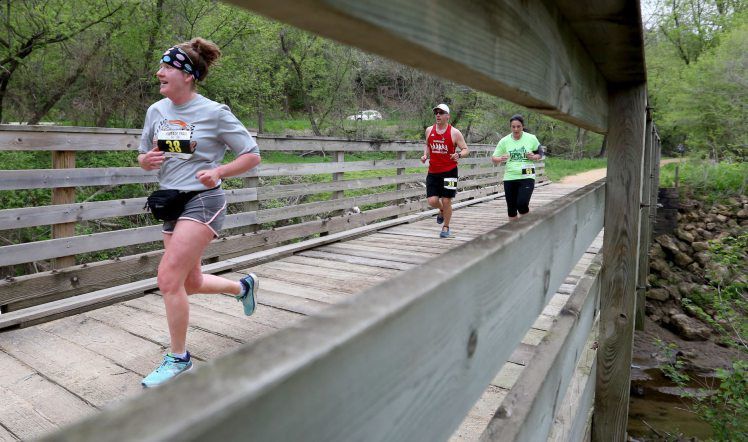It doesn’t take much recreation to give your body a boost.
“Exercising, especially when just starting, can be a scary endeavor,” said Krista Viertel, a physical therapist at MercyOne Dubuque Medical Center. “However, research shows that just 150 minutes per week — approximately 20 minutes a day — can achieve health benefits.”
Nicole Hutchison, owner and CEO of Statera Integrated Health & Wellness Solutions of Dubuque, said the most important thing to do is, simply, to move.
“We all kind of carry a stigma about exercise and what exercise should be or what it’s supposed to be,” said Hutchison, a physical therapist, health coach and certified strength and conditioning coach. “If we could just understand that our bodies are made to move — they’re not made to be sedentary.”
Just move
Statistics from the U.S. Centers for Disease Control and Prevention suggest only 53.3% of adults reach the 150 minute-per-week target.
Viertel said people don’t need to stick to a regimented exercise schedule.
“Can’t tolerate 20 minutes consecutively? Shorter bouts of activity are beneficial as well, although the American College of Sports Medicine does recommend at least 10 minutes of activity consecutively to achieve the greatest benefit.”
Hutchison said the scope of beneficial body movement extends beyond the traditional vision of a gym-based workout.
“Moving our bodies can be anything from gardening to biking to kayaking,” she said. “It can be going for a walk or going for a run. Exercise is simply moving your body, getting the blood flowing.”
Hutchison said she encourages people who spend most of the day in sedentary positions to set reminders to get up and move at least five minutes every hour.
“That can be doing some yoga, that can be doing some stretches, that can be walking around the building or going up and down the stairs,” she said. “Whatever it needs to be for you. You don’t have to go from couch to running marathons. You can go from couch to walking to the mailbox. You can go from couch to parking a little bit farther away from the grocery store when you get there. Those little things are going to make huge differences.”
Hutchison said exercise can fit in the busiest personal schedules.
“I’m finding more and more clients who are becoming more creative to get more movement into their day,” she said. “Having walking meetings. Walking on a treadmill while they’re listening to a call.”
Hutchison said movement is part of a multi-faceted approach to wellness.
“When people think about getting healthy, it’s not just eating right and it’s not just exercising, it’s not any one thing – it’s myriad things,” she said. “Movement is one of those things. They say now that being sedentary is the new smoking. It’s more deadly than smoking is, which is really a scary thought.
“If I’m working with a client who is maybe in their 50s and has been sedentary their whole life and they’re really having trouble finding a motivation to move their body, I ask, ‘What really gives you energy? What makes you want to get out of bed in the morning? What makes you smile?’ Is it being out in the garden? Is it bowling? Is it seeing the grandkids? Whatever it is, then we look why does that bring you joy and then how can we connect that with moving your body.
“Because you need to move your body to be able to achieve those things that bring you joy.”
Plentiful benefits
Hutchison said recreation can boost physical, mental and emotional health.
“God did not make us to sit. He made us to move and when you move your body there are studies that show the benefits that it has for us,” she said. That’s the case, no matter one’s age. “Obviously physically, it will help us with strength and flexibility and cardiovascular health. It helps stabilize metabolism and those kinds of things.”
The CDC reports that one of every 12 cases of Type-II diabetes could be prevented if people got the recommended amount of physical activity and one in 15 cases of heart disease.
“It also helps promote brain health and reduces cognitive decline,” Viertel said.
Better moods
Viertel said mood is heavily influenced by physical activity.
“Exercise assists in producing brain chemicals called endorphins, which is a ‘feel good’ chemical,” she said. “One to two hours of exercise a week can drastically reduce depressive symptoms and stress, and improve confidence.”
Hutchison said recreation can also help improve sleep.
“As adults, they recommend seven to nine hours of sleep a night,” she said. “Some of us need more, some of us need less, at different times of the year and different times in your life. Studies show sleep increases our mental focus and efficiency during the day. When you bring movement into the picture, you’re going to be able to fall asleep more readily and you’re going to be able to sleep more peacefully — you’ll be able to get more quality rest during the night — and you’re going to wake up more refreshed the next morning if you have some activity during the day.”
The great outdoors
Hutchison said studies have shown that being outdoors helps improve mental and emotional health.
“That connection with nature makes a huge difference for us as human beings,” she said. “It helps us to feel more relaxed, helping to ease anxiety, helping with stress management. It can also foster community and building relationships, which is a secondary benefit of the exercise and spending time with others.”
Erik Hogstrom writes for the Telegraph Herald.















